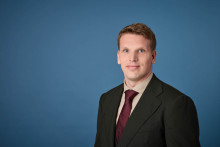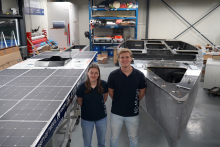Monday morning Education Minister Robbert Dijkgraaf was a guest at the national congress of universities of applied sciences at the Brabanthallen in 's-Hertogenbosch. He was interviewed on the podium in front of an audience of around 1000 staff and administrators from universities of applied sciences.
Dijkgraaf is a theoretical physicist as well as a former student in higher professional education, having studied for a while at the Rietveld Academy. ‘For me, that was probably the most profound experience of my life up to now’, the minister said. He added that that was where he learned to do research. ‘Not in the physics programme.’
Go as far as you want
So he considers the professional doctorate ‘fantastic’. After all, why should a university be the only place for someone to do research? Higher professional education is a different direction from research-oriented higher education, he explained, and how far you can go in that direction is a moot point. ‘In fact you need to be able to go as far as you want.’
At a university people can study for a PhD after their Master's programme. They then become doctors. Now universities of applied sciences are allowed to do something similar with their own type of research. The researchers will then get a professional doctorate (PD). Dijkgraaf feels this is an example of emancipation in education. ‘A century ago one in a thousand Dutch people entered higher education. There is a continual improvement in how much we can do and how far we can go.’
The minister then joined a panel that also included Marcel Levi, chair of the Dutch Research Council. Levi too considers scientific research at universities of applied sciences important. All students should come in contact with research, he believes, so there need to be more lecturers with this experience in research. He is aware that some universities of applied sciences are hesitant but hopes that ultimately they will all go ahead with research.
Symbol
Anka Mulder, chair of Saxion University of Applied Sciences and a board member of the Netherlands Association of Universities of Applied Sciences, was another member of the panel. She called the professional doctorate a ‘hugely important step’. She regards it as ‘the symbol of higher professional education and its ambition, drive and excellence’.
Dijkgraaf concurred. He pointed out that getting a PhD is no guarantee for obtaining a job in the world of science and that people with a PhD often end up in the business sector. In his view there is a great need for researchers with knowledge of professional practice.
Earlier in the day, Maurice Limmen, chair of the Netherlands Association of Universities of Applied Sciences, warned that the working population is going to shrink considerably and that it will be a hard task for universities of applied sciences to train enough people. For that reason alone innovation is essential.
Dijkgraaf added his voice on that point. ‘People entering the labour market will ultimately have to do so more wisely and at a higher level’, he said. The professional doctorate fits in with that development.
200 names
The professional doctorate does not come as a bolt out of the blue. Mulder showed a list of around 200 names of people who have campaigned for the introduction of the PD in recent years. The experiment will start in January in seven domains.
There will be five PDs per domain per year, a total of 35. The experiment runs for four years, so 140 graduates in higher professional education will take part. In the panel discussions Limmen called for extra money to embed research in higher professional education.
For a long time, universities were sceptical about research at universities of applied sciences, but in 2019 they supported the plan to develop such doctorates. They did however want researchers to get a different degree from that awarded at universities.






